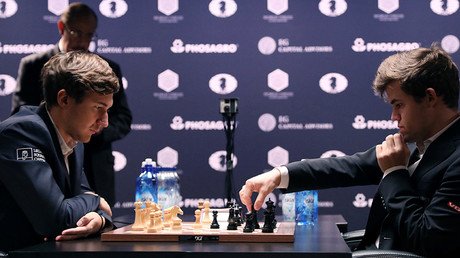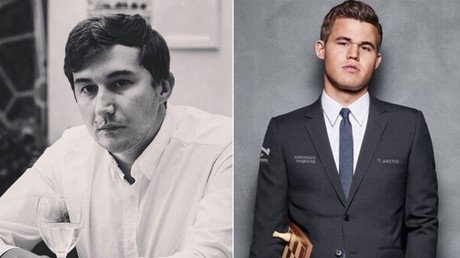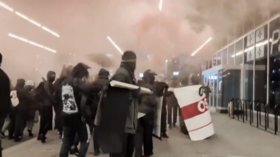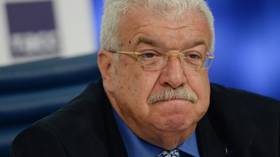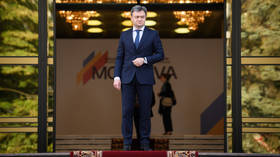Nerves of steel: Chess Grandmasters prove their mettle
Preparing for victory means nothing if you’re not prepared to win. Without self-belief and a winning mentality, all the money in the world will not prepare you to be first across the finish line, the recent Karjakin-Carlsen battle shows.
I could barely feel my arms, let alone lift them. In addition to broken bones in my left hand, in warm up I’d broken my right thumb. With the fight hinging on my conclusively winning the third and final round, my opponent was in control of the result. The people who’d cheered me into the ring, my team-mates who looked on expectantly – they would lose heart in our project if I failed. I had three minutes to win, not just survive...
Mental strength and the ability to translate this into action is the most important part of sport. Physical fitness is important, though, when you reach the deciding moments of a hard-fought match, if your brain and heart don’t work as one and you step out of the moment, you lose. You can be afraid, fearful even, though not of victory. This is not psychology, it’s simple logic. The conclusion of the World Chess Championship this week illustrated that perfectly.
Sergey Karjakin came into the showdown having only ever beaten Magnus Carlsen once in 21 classical matches. Even removing the 16 draws, a .200 (20%) win rate is pretty terrible. On November 10, I read a short preview in a Russian publication that called it even, with Karjakin a slight favorite. The financial support for Karjakin’s preparation touched on the one-million-dollar mark, and for a while it seemed Russian tax money well spent. He fought hard, led at one point before tying the classical series 6-6. Before he got to the tiebreak, however, he’d already lost.
In Game 4 of the tiebreak, Hungarian Grand Master Judith Polgar called Karjakin’s mental state into question, saying that he was “terribly passive” and not doing enough to create winning chances. In Game 3 of the playoff, for me, it was done and dusted. He had upset Carlsen in Game 2 when the Norwegian looked a surefire winner. Momentum and opportunity was his. And he bottled it as if he’d bottled the classical series.
My opponent that night was fitter, younger, stronger, heavier, and better than me. He had sauntered through the first round, picking me off at will. My fightback in the second hadn’t dampened his spirits. He smiled at me and walked to the center of the ring to touch gloves for the start of the final round. Momentum and opportunity was his...
The Fischer-Spassky Battle Royale
In 1972, Bobby Fischer took on the dominant Boris Spassky to battle for the title of World Champion. The series took place during a period of détente in the Cold War, with the American Fischer looking to break the Soviet stranglehold at the top of chess. His accusations of unfair practices and match-fixing made the shootout into a battle between Good vs Evil, not just West vs East. Forty-four years later, the bile and hypocrisy which greeted Julia Efimova in Rio’s Olympic pool would not have been unfamiliar to Spassky.
The brilliant and erratic Fischer channeled his inner Conor McGregor to psyche out his opponent before the matches even began. Showing up late, insisting on changes from chess board to payments, he used every last weapon he could to gain an advantage over the World Champion. It didn’t appear to pay off as Spassky jumped to a 2-0 lead. The normal script reads – when the favorite and champion gets their nose in front, they keep it there and do what they have to for the W. But in true Hollywood style, the underdog had their day.
Bobby won Game 3 and broke Boris. It was the American’s first ever win over the Soviet Hero and he firmly placed his foot on his opponent’s throat. Winning just one more game in the next 18, Spassky cracked and hid. Resigning without coming to congratulate his foe showed just how good a job the American had done.
Yet consider this. There was the pressure of the entire Soviet Union on Boris’ shoulders. He was up against everyone outside of the Soviet satellite states and allies. The match took place at a time when the ideological battle for global dominance was showing itself on the track field and every conceivable forum. Every advantage to be gained was sought by the USA and USSR. It was a heavy burden for one person to carry, and it proved too much for Boris.
The bell went, we touched gloves, and he threw a lazy jab that missed. Suddenly I found myself on the ropes, fending off a barrage of blows. Was my 63rd fight going to be my 8th loss? I hung on for dear life and as he trash talked. The referee pulled us apart and told us to box on. I didn’t like how my young opponent was grinning at me. I didn’t like how he was tensing his shoulders and moving his feet to launch a new assault. I thought, this part of the ring is soft, if I fall here, it won’t hurt...
Karjakin blinks first
Karjakin could see the win. He had Carlsen where he wanted him. He could see the finish line. Yet taking his seat for Game 3, he wasn’t there. All the money spent on preparation. The energy expended to get into a winning position. The hopes, he believed, of a nation under attack were on his shoulders. And he froze. He allowed the pressure and fear to turn his desire for a win into the need to win. Carlsen sensed it and struck. He had messed up in Game 2 and got back into the moment. The young Norwegian placed his foot on Karjakin’s throat. It wasn’t just the clock that Karjakin lost control of. His 2nd chance to win was gone.
When you are in the moment, everything slows down. Experience, training, mental strength, and control of your emotions gives you a clarity that not even the most powerful drug can deliver. We have all experienced this at one moment in our lives. Being able to call on this is the difference between a Champ and Chump. Magnus moved faster the more he slowed down, his opponent was the opposite. His brain, heart and body went out of coordination and he handed the win to the defending Champion.
He seemed to punch in slow motion as I stepped to the left and past him. As he turned I cracked him with a weak right hand that wouldn’t have troubled a wet sheet of paper. That finish line he saw had disappeared. I poured on the pressure and used every ounce of energy and will I had left. With 30 seconds to go, I could afford to take a break, as he was broken. The last decision of the night was greeted with a roar and victory was mine. I’d stayed in the moment and won.
Like my opponent that night in 1997, Sergey had lost the match long before the tiebreaker. When he won Game 8 of the classical series, the title was his for the taking. After 7 draws, he had the finish line in front of him and just needed to show the mental strength to stay in the moment to dethrone Magnus.
In Game 9, he did what was needed before a combination of a winning mentality (Carlsen) and fear (Karjakin) decided the match in Game 10. By winning and drawing level, there was never a hope of the Russian winning. Even that final fightback in Game 2 of the tiebreak was just a momentary ebb in the momentum, like Game 11 in 1972 when Spassky broke Fischer’s run. Like Boris in Iceland, Sergey never believed he was going to win. Ultimately it was Scandinavian cool and nerves of steel that prevailed.
Alan Moore, for RT
The statements, views and opinions expressed in this column are solely those of the author and do not necessarily represent those of RT.
